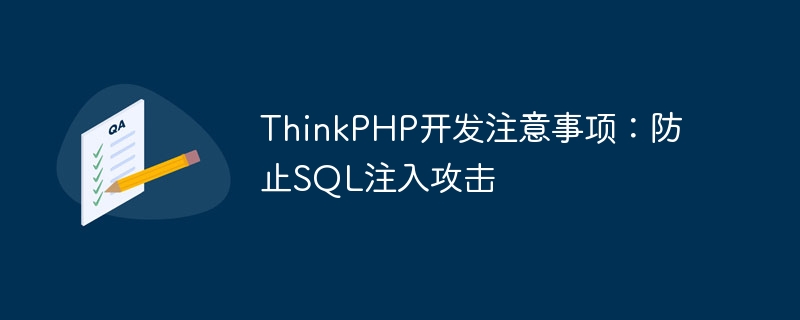

ThinkPHP is a commonly used PHP development framework with powerful functions and flexible development methods, but during use, we need to pay attention to preventing SQL injection attacks. SQL injection attack refers to an attack method that inserts malicious SQL statements into user-entered data to tamper with database operations or obtain sensitive information. This article will introduce some precautions to prevent SQL injection attacks.
For example, suppose we need to query whether the user name and password entered by the user match, we can use the prepared statement like this:
$username = $_POST['username']; $password = $_POST['password']; $pdo = new PDO('mysql:host=localhost;dbname=test', 'username', 'password'); $stmt = $pdo->prepare('SELECT * FROM users WHERE username = :username AND password = :password'); $stmt->bindParam(':username', $username); $stmt->bindParam(':password', $password); $stmt->execute();
By using the prepared statement, even if the user input data Keywords containing SQL statements cannot execute malicious code.
$username = $_POST['username']; $username = filter_var($username, FILTER_SANITIZE_STRING);
The filter_var function can filter data according to the specified filter. For example, using the FILTER_SANITIZE_STRING filter can remove HTML tags and special characters in the string to prevent malicious injection.
$validate = new hinkValidate([ 'username' => 'require|max:25', 'password' => 'require|min:6', ]); $data = [ 'username' => $_POST['username'], 'password' => $_POST['password'], ]; if (!$validate->check($data)) { // 验证失败,处理错误 } else { // 验证通过,进行后续操作 }
By validating user input, you can prevent security issues caused by malicious injection and other format errors.
$user = new UserModel(); $user->username = $_POST['username']; $user->password = $_POST['password']; $user->save();
The ORM framework will automatically filter and verify user input, and generate secure SQL statements for database operations, thereby preventing SQL injection attacks.
To sum up, preventing SQL injection attacks requires us to pay attention to the use of prepared statements, filtering user input, validating user input and using the ORM framework during the development process. Only by ensuring the security of user input can we effectively prevent SQL injection attacks and protect the data security of our applications and users.
The above is the detailed content of Things to note when developing ThinkPHP: Preventing SQL injection attacks. For more information, please follow other related articles on the PHP Chinese website!